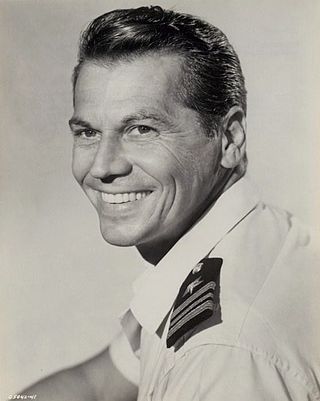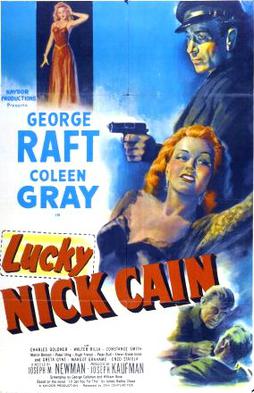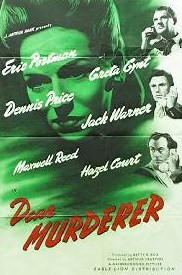
Ronald Egan Randell was an Australian actor. After beginning his acting career on the stage in 1937, he played Charles Kingsford Smith in the film Smithy (1946). He also had roles in Bulldog Drummond at Bay (1947), Kiss Me Kate (1953), I Am a Camera (1955), Most Dangerous Man Alive (1961) and King of Kings (1961).

Bella Darvi was a Polish film actress and stage performer who was active in France and the United States.

Sir Bruce Lovat Seton, 11th Baronet was a British actor and soldier. He is best remembered for his eponymous lead role in Fabian of the Yard.

Greta Gynt was a Norwegian dancer and actress. She is remembered for her starring roles in the British classic films The Dark Eyes of London, Mr. Emmanuel, Take My Life, Dear Murderer and The Ringer.

Forbidden Cargo is a 1954 British crime film directed by Harold French and starring Nigel Patrick, Elizabeth Sellars and Jack Warner.

Dry Rot is a 1956 British comedy film directed by Maurice Elvey, and starring Ronald Shiner, Brian Rix, Peggy Mount, and Sid James. The screenplay is by John Chapman, adapted from his 1954 Whitehall farce of the same name.

Train of Events is a 1949 British portmanteau film made by Ealing Studios, directed by Sidney Cole, Charles Crichton and Basil Dearden and starring Jack Warner, Peter Finch and Valerie Hobson. The film premiered on 18 August 1949 at the Gaumont Haymarket in London. In the film, as a train is heading for a crash into a stalled petrol tanker at a level crossing, four different stories are told in flashback.

The Girl on the Pier is a 1953 British crime film produced by John Temple-Smith, directed by Lance Comfort and starring Veronica Hurst, Ron Randell, Brian Roper, Campbell Singer and Anthony Valentine. Crime melodrama set on Brighton Pier.

The Ringer is a 1952 British mystery film directed by Guy Hamilton and starring Herbert Lom, Donald Wolfit, Mai Zetterling, Greta Gynt, William Hartnell, and Denholm Elliott. It was Hamilton's directorial debut and the third English-language sound version of Edgar Wallace's 1929 play, which in of itself was based on his 1925 novel The Gaunt Stranger. The previous adaptations had come in 1928 (silent), 1931, 1932 (Germany-Austria), and 1938.

The Girl in the Picture is a 1957 British second feature crime film directed by Don Chaffey and starring Donald Houston and Patrick Holt.

A Tale of Five Cities is a 1951 British-Italian international co-production comedy drama film directed by Romolo Marcellini, Emil E. Reinert, Wolfgang Staudte, Montgomery Tully, Irma von Cube and Géza von Cziffra. The five cities cited in the title are: Rome, Paris, Berlin, London, and Vienna.

Dancing with Crime is a 1947 British film noir film directed by John Paddy Carstairs, starring Richard Attenborough, Barry K. Barnes and Sheila Sim. A man hunts down the killer of his lifelong friend.

I'll Get You for This is a 1951 British thriller film by Joseph M. Newman starring George Raft, Coleen Gray, and Enzo Staiola. It was made from an adaptation by George Callahan and William Rose of James Hadley Chase's 1946 book of the same name. The setting was shifted from Las Vegas in the novel to an Italian gambling resort.

The Dark Eyes of London is a 1939 British horror film produced by John Argyle and directed by Walter Summers, and starring Béla Lugosi, Hugh Williams, and Greta Gynt. The film is an adaptation of the 1924 novel of the same name by Edgar Wallace. The film is about a scientist named Dr. Orloff who commits a series of murders for insurance money, while periodically disguising himself as the blind manager of a charity to further his scheme.

Dear Murderer is a 1947 British film noir crime, drama, thriller, directed by Arthur Crabtree for Gainsborough Pictures, and starring Eric Portman and Greta Gynt.

Murder at 3 a.m. is a 1953 British crime film second feature directed by Francis Searle and starring Dennis Price, Peggy Evans and Rex Garner. A Scotland Yard detective investigates a series of attacks on women.

Hammer the Toff is a 1952 British second feature crime film directed by Maclean Rogers and starring John Bentley and Patricia Dainton. The film was based on the 1947 novel of the same name by John Creasey, the 17th in the series featuring upper-class sleuth Richard Rollinson, also known as "The Toff".
Escape Route is a 1952 British black-and-white second feature thriller film, directed by Seymour Friedman and Peter Graham Scott, and starring George Raft, Sally Gray and Clifford Evans.

Blackout is a 1950 British crime drama film directed by Robert S. Baker and starring Maxwell Reed and Dinah Sheridan. It was made as a supporting feature.

The Hostage is a 1956 British crime film directed by Harold Huth and starring Ron Randell, Mary Parker and John Bailey.



















